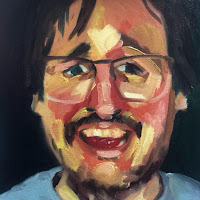Childhoods are not shaped by design but by the random accumulation of thousands of moments. Moments form the childhood, the childhood forms the adult. This kind of moment: the discovery of dozens of dead cockroaches accompanied by the lingering scent of bug bombs. Those dead roaches may leave as large an imprint on the young mind as the living brothers and sisters he passes in the hall daily. More moments: digging for fossils in an empty riverbed, a bumpy drive to church, contemplating God in the ruins of an old cabin in the woods, cat pee on the laundry pile. The cumulative months a father spends in bed instead of providing for his family can have equal effect to the single moment; one of those days in bed, he casually dismisses a frivolous question about the Incredible Hulk from his curious son. That moment of dismissal doesn’t feel any different from any of the countless other mundane moments and was, in fact, different only because of the impression that it left.
In One Dirty Tree, Noah Van Sciver does more than catalog these meaningful childhood moments from his own life, he examines how they formed and haunt the adult recollecting them. Switching organically between the past and more recent present, often devoting whole pages to single quiet moments, Van Sciver visits the ways in which his troubled childhood continues to trouble his adult life. The childhood sections of One Dirty Tree are populated by his claustrophobically large Mormon family and the house they cohabit. The family and home are physically absent in the later sections, but psychically present in every alienating interaction Van Sciver has as an adult. A child always hungry for food, the adult later works at a restaurant. A child always hungry for the stability of normalcy, the adult later engages in a relationship with a traditional young woman who not only encourages normalcy but sometimes cruelly discourages abnormality. Before moving into a beautifully remodeled building with her, he was living in a cheap, run-down apartment—a miniature repeat of his childhood home. By all appearances, Van Sciver is successfully leaving his wretched past behind. But the effects of his childhood and the poverty that pervaded it cling to him. He can’t forget and neither can his girlfriend.
Poverty itself struck as many blows to young Van Sciver as the physical blows his father and brothers did. The shame of growing up poor and different manifests itself in adulthood as an inferiority complex that cripples his relationship and eventually renders him a literal monster. As his personality develops from childhood into adulthood, so too does this alter ego monster of his. There is a duality to Van Sciver’s growth and each moment experienced feeds one or both sides to this duality--his burgeoning yin and yang. On one side we have the budding artist, on the other, the tortured monster. From the beginning, young Van Sciver showed a talent for drawing and this act of creative expression comforted him during moments of strife. The consumption of art, in the form of his brothers’ comic books, was also a comfort. Drawing or reading, he fed the artist within. Looking over his shoulder to ensure nobody witnessed him entering his ramshackle house fed the young monster.
The monster is an interesting metaphor because while it ostensibly represents for readers Van Sciver’s internal feelings of inadequacy, it also reflects the way others see him. He cannot hide from the monster himself, nor can he hide it from others. While the book version of Van Sciver seems repulsed by his own monstrosity, one suspects the author Van Sciver recognizes his monster’s dual purpose as an asset—a representation of the benefit of his other-ness. The accumulation of childhood traumas damaged but also strengthened the individuality of the man. The monster and artist walk hand in hand. Although only visually rendered in those instances of self-doubt, it isn’t difficult to imagine the monster present at other times, like at the art opening. Here Van Sciver recognizes a difference between the popular art on the walls and his own art, the other artists and himself, but the recognition doesn’t seem to shake his inner resolve, this particular alienation needn’t cause shame. The same childhood embarrassment that fed the monster also fed an individual artistic drive. His youthful curiosity about the Incredible Hulk made perfect sense, coinciding with the development of his own inner Hulk and his start as a comic book artist (portrayed humorously with a recreation of his own childhood scribbled dinosaur comics).
Although the climactic end of his relationship (whoops, spoiler alert) once again evokes his monster-self, we recognize, perhaps at the same time as Van Sciver in the story, that the monster and the artist are inseparable, each strengthened by the presence of the other. Without the artist, the monster would have no humanity; without the monster, there would be no book.
--------------------------------------------------------------------------------------------
Spencer Hicks made a couple of zine comic books that were well received by nearly a dozen people and has a really great idea for a new one that he got 3 pages into drawing several months ago that he'll probably never get back to because its too hard. He also paints. Check out his art at @shpensherhicksh on Instagram!


No comments:
Post a Comment